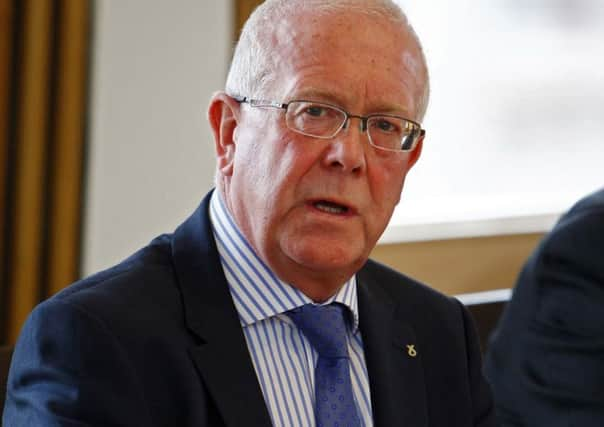Scottish Government demands more powers to deal with financial ‘blackhole’


SNP ministers have warned their ability to deal with the shortfall is “far too limited” and they want the cap on using reserves to be abolished.
There are also calls for a review of the “fiscal framework”, which allocates Holyrood’s annual budget following the devolution of income tax powers, to look at whether tax revenues in Scotland reflect the country’s performance. Political opponents have branded the move an attempt to “clean out Scotland’s coffers.”
Advertisement
Hide AdAdvertisement
Hide AdThe fiscal powers effectively go “live” next year (2020/21) when the Scottish Government faces direct responsibility for ensuring their devolved budget of about £35bn is balanced with its new powers over setting income tax which came into force two years ago.
But SNP ministers were left reeling when a recent report by the country’s economic watchdog, the Scottish Fiscal Commission, warned that they face a £229 million shortfall next year. This was as a result of forecasting errors by the SFC and Office for Budget Responsibility (OBR) in their estimates for income tax. This will rise to £608m the following year, then £188m after that.
A Scottish Government spokesman said: “The Scottish Fiscal Commission’s report shows that small changes to their assumptions can be a factor in relatively large swings in income tax forecasts.
“This uncertainty is compounded by having two different forecasters, with small differences between them generating significant variation in forecasts.
“The size of the predicted budget adjustments makes clear that the Scottish Government’s current powers to deal with this volatility are far too limited, and that changes need to be made to the Fiscal Framework to abolish the restrictions set on the use of the Scotland Reserve.”
The reserve allows ministers to draw down cash when funds revenues are lower than expected. There is expected to be about £300m in the pot by the end of this year, but only £146m of this could be used in 2020/21. This would not cover the £229m shortfall being forecast in next year’s budget.
In addition to this, Scottish ministers also have borrowing powers of up to £300m they can utilise, but have indicated they are not planning to use them. Even this would still not be enough to meet the looming £600m-plus shortfall next year.
MSPs on Holyrood’s finance committee have raised concerns that the £1bn black hole has emerged as a result of income tax forecasts errors – despite the Scots income tax being broadly in line, albeit slightly below, expectations.
Advertisement
Hide AdAdvertisement
Hide AdThe main reason for the gap was the faster than anticipated rise in tax receipts south of the border as a result of increased earnings.
Committee convenor Bruce Crawford warned this could mean Scotland would always be at the mercy of wages in the rest of the UK growing at a “disproportionate level” compared with Scotland.
“Does it not suggest then that there’s a flaw in the way the fiscal framework operates,” he told MSPs last week.
The SNP MSP also warned that the latest round of budget shortfalls may not be a one-off, adding: “We’re going to be in a competition here which we cannot win.”
A review of the fiscal framework is due to be undertaken in 2021 and ministers want the issue to looked at. A statement added: “The successful devolution of tax powers, both current and future, should ensure that tax revenues reflect Scottish performance. This is one of the areas that the Fiscal Framework Review will need to investigate.”
But Tory Finance spokesman Murdo Fraser, right, warned the prospect of abolishing the cap on reserves risked plunging Scotland’s public finances into the red.
“It is Derek Mackay’s job to balance the Scottish Government’s budget and protect public services,” he said.
“It is not to clean out Scotland’s coffers when his plans don’t work.
Advertisement
Hide AdAdvertisement
Hide Ad“The SFC have demonstrated that the SNP can’t do the maths and are poised to raid the biscuit tin.
“It is only two years since income tax devolution started, under arrangements negotiated and agreed by the SNP Government. They are now admitting that they didn’t do their homework at that stage.
“Extending borrowing powers simply means that future governments, and taxpayers, have to carry the can for the failures of today.”
The issue could intensify over the coming years if post-Brexit immigration curbs hit the size of Scotland’s workforce and population. It could see income tax receipts suffer and further budget shortfalls.
Nationalist MSP Tom Arthur, who sits on the finance committee, added: “Leaving the EU, with or without a deal, will be devastating for Scotland’s economy. All of Scotland’s population growth over the next 25 years is projected to come from migration – but the UK Government’s proposals to cut migration by tens of thousands would cost the Scottish economy up to £10bn a year by 2040.”